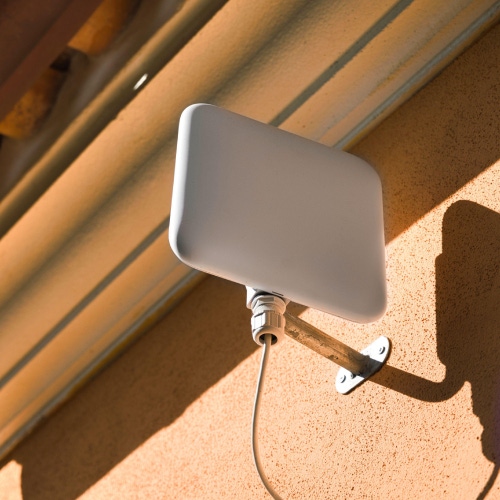Fixed wireless companies keep pushing NTIA on BEAD rules
FWA providers want NTIA to amend BEAD's restriction on unlicensed spectrum projects. Some advocates agree the change is needed to close the digital divide.

Fixed wireless access (FWA) providers are not giving up their fight to get the NTIA to alter its fiber-focused rules for the $42.5 billion Broadband Equity, Access and Deployment (BEAD) program. And they have the support of advocates who agree that certain rules could jeopardize communities' ability to close their digital divides.
At the heart of the service providers' ongoing concern is NTIA's exclusion of projects using unlicensed spectrum from its definition of "reliable broadband" in the notice of funding opportunity (NOFO) for BEAD. FWA providers, many of which deliver services via unlicensed spectrum, have been raising the alarm since last May when the BEAD rules were published. They argue that this and other rules violate the "tech neutral" spirit of the infrastructure law.
In recent months, representatives from the Wireless Internet Service Providers Association (WISPA) and member companies like Tarana Wireless have held meetings with staff at NTIA to discuss their concerns and provide evidence that fixed wireless over unlicensed spectrum is as reliable as other technologies approved for BEAD funds.
In a letter last week to NTIA Chief Alan Davidson about those talks, WISPA CEO David Zumwalt summarized their meetings and urged NTIA to publish an amendment to the BEAD NOFO to allow for unlicensed spectrum use.
"We believe that these meetings with Cambium Networks, Siklu, and Tarana Wireless have proven that wireless networks using entirely unlicensed spectrum meet the BEAD NOFO definition for reliable broadband service," said Zumwalt. "WISPA respectfully requests that NTIA publish an amendment to the BEAD NOFO that includes these networks in the list of reliable broadband services."
Zumwalt's letter referenced some of the engineering advancements that FWA advocates say make unlicensed spectrum as or more reliable than fully licensed spectrum projects, including: "frequency reuse and channel agility, channel bonding, interference mitigation and noise cancellation techniques, spatial processing, distributed massive MIMO, digital beam forming and beam steering, multi-path signal processing, and timing techniques."
As such, the letter notes, "fixed wireless providers using entirely unlicensed spectrum will continue to provide reliable broadband service for more than 10 years and meet NTIA's sustainability goals."
Figure 1:  (Source: Wirestock, Inc./Alamy Stock Photo)
(Source: Wirestock, Inc./Alamy Stock Photo)
Beyond wanting to compete for grants, with billions of federal dollars set to change the broadband landscape, FWA providers are also looking to defend their existing turf. As Zumwalt writes, WISPA is concerned with BEAD funds being used to "overbuild the privately funded networks of many WISPA members, who invested their own capital to deploy service in rural areas where other carriers did not."
He added: "There is a very real threat that WISPA members serving businesses and homes with networks using only unlicensed spectrum will face the substantial erosion of their businesses and livelihoods when forced to compete with BEAD-funded competitors that can subsidize their costs."
While NTIA has yet to say whether it will offer an amendment on BEAD to allow for unlicensed spectrum use, Zumwalt told Light Reading the organization is "encouraged" that NTIA staffers "continue to take meetings."
NTIA did not respond to Light Reading's request for comment on the matter as of this writing.
'Once in a lifetime'
When it comes to arguing for a fiber-first versus tech-neutral approach to the BEAD program, industry representatives from the fiber and fixed wireless sides of the aisle both note that this is a "once in a lifetime" investment by the US federal government. For fiber advocates, that means investing in "future-proof" fiber-to-the-home technology everywhere and not relegating certain regions to "inferior" technologies. FWA players, meanwhile, argue that the funding available won't cover fiber everywhere and prioritizing fiber will leave people without service longer.
"If we were to solely try to solve this problem using fiber, $42.45 billion ... is nowhere near going to meet the goals of the legislation, which is 100% of all households in the United States," said Carl Guardino, vice president of government affairs at Tarana, in a conversation with Light Reading. "So we would hope, whether through a change in the NOFO and/or clearly communicating to states and territories their rights to have waivers to meet the needs of their local communities, that we are looking at a fiber-and approach."
A relatively recent hire for Tarana, Guardino was brought on in mid-November to lead the company's new public policy team as it gears up to work with the US and global governments on the company's "stated mission to close the digital divide," and to "ensure that not only can we cost effectively provide high-capacity, reliable broadband service, but we can do it in a timely way," said Guardino.
Apart from collaborating with WISPA to lobby the NTIA and Congress on BEAD, Guardino said his team is also taking their FWA advocacy work to states and local communities.
That includes "reaching out to county, city, town officials to remind them of the important role they're going to play with their state" in the BEAD process, said Guardino. "And to make sure that they know that not only should they be at the table, but they are a critically needed voice, or they're actually jeopardizing funds coming to their state," he added.
'Hamstringing' communities
Another group, Next Century Cities, which supports local communities in expanding broadband, also said it hopes to see a change in NTIA's rules.
According to Ryan Johnston, senior policy counsel, several of Next Century Cities' member municipalities and anchor institutions have used unlicensed spectrum as their only available tool throughout the pandemic to extend existing service within their communities.
"We've been hearing a lot of rhetoric come out of the NTIA, come out of the FCC, saying, 'We want all this money to be usable by the communities to put in place the projects that they need to do to keep their communities connected'," Johnston said. "But at the same time, they're sort of hamstringing them by saying, 'Well, the biggest asset that you all have is one that we aren't going to support'."
Asked if Next Century Cities supports an amendment to the BEAD rules that defines fully unlicensed spectrum networks as reliable broadband services, Johnston said: "We certainly want as much funding to be available to work with unlicensed spectrum as possible."
Related posts:
— Nicole Ferraro, editor, Light Reading, and host of "The Divide" podcast.
About the Author(s)
You May Also Like




_International_Software_Products.jpeg?width=300&auto=webp&quality=80&disable=upscale)







